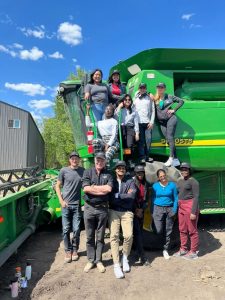Leduc Growing Project
The Leduc Growing Project recently hosted 14 guests from the Alberta Council for Global Cooperation’s Global Connect program. The tour helped to show how Albertans are contributing to global development,
A visit from the Global Connect program
The Leduc Growing Project recently hosted 14 guests from the Alberta Council for Global Cooperation’s Global Connect program. The tour helped to show how Albertans are contributing to global development,
It was a day filled with activities. Curtis invited the group to the Nutrient Ag Solutions site to talk about the retail-agriculture connection. A visit to the field included a conversation with committee member Alex about women in agriculture. And Colin hosted the group to some grain tasting and a slide show about his trip to India. Of course, some good-old tire-kicking was part of the visit!
The Alberta Council for Global Cooperation is a network of Alberta individuals and organizations working to advance sustainable development and global citizenship. The Council hosts a yearly Global Connect program, which allows young adults to explore international development and the themes of sustainability, gender equity, inclusiveness, and more.
Thoughts from Global Connect participants
From Priscilla O.
“My best experience at Global Connect was visiting the Nutrien facilities, learning more about the Canadian Foodgrains Bank and meeting some farmers involved in the Leduc & District Growing Projects on June 3, 2022.
“The principle of ‘think global, act local’ has been a thread connecting our Global Connect program site visits. This experience best exemplified acting locally with a global mindset for me. Seeing how a local response to a global emergency of world hunger can have significant impacts on people’s lives and create ripple effects of change amazed me.
“As well, the farmers and project managers, like Ary Vreeken, we talked to were very passionate about their work and displayed a remarkable commitment to the global community, despite some local financial, operational, and labour costs. Thanks to their hard work, they’ve raised millions of dollars for the Canadian Foodgrains Bank to feed people and provide sustainable relief and solutions to end global hunger, which is incredible.
“Though I’ve lived in rural Alberta for four years, I never really understood Alberta’s farming and agricultural industry. Hence, this experience was unique because I didn’t know what to expect when I first saw farm visits listed in the program schedule. Thankfully, this session made me appreciate local food production more and provided insight into the resiliency and humanitarianism existing here.”
From Olivia S.
“ACGC was an amazing 12-day experience that I feel so lucky to have gotten the chance to be a part of. They supported 10 youth of all different races, cultures, and backgrounds to go on an amazing journey through Alberta discovering all the different ways in which Albertans support our global community.
“It was a special experience for me because it educated me and opened my eyes to international injustices taking place around the world right now and what we can do to help. We are incredibly privileged to be in a country where women and children have rights and are educated and where we have access to food and shelter.
“A highlight of the trip for me was learning about what the Leduc farmers are doing for our international community. A very kind man gave 160 acres of land for a very good price to multiple farmers who came together to grow and sell a crop on the donated land. All of the money produced from that crop goes to international development in agriculture, which has been up to $176,000 a year! This coalition alliance for combined action the farmers created has made a huge global impact.
“The farmers were also able to give our ACGC group some insight on a trip to India they went on to learn from the farmers of Indian land. The goal of the trip was to learn and teach different ways to harvest crops in poorer places in rural India.
“One important aspect of that trip the farmers noted was women’s roles in the community. They believed educated women generally made better decisions than men when it comes to agricultural and financial decisions. Women also tend to work better together and when they encouraged women to farm their own crops the respect for the women by the community was increased. They told us that development work is about social work, if you can get the men and women to come together and work the community will thrive.”
Thanks, Alberta Council for Global Cooperation, for visiting us!

